
Best Free VPN for China in 2025: Bypassing Internet Censorship
- Table of Contents
- The Great Firewall: Why Use a Free China VPN?
- How to Choose the Best Free VPN for China
- The Best VPN for China: Free Options Quick Comparison
- The 5 Best Free VPNs That Work in China
- 1. hide.me -- Best Free VPN for China
- 2. Proton VPN -- Fastest Free VPN for China
- 3. Windscribe -- Free China VPN With Unlimited Simultaneous Connections
- 4. TunnelBear -- User-Friendly Free VPN
- 5. ExpressVPN -- Best VPN for China With Free Trial
- Community Discussion: Other Free VPNs for China Mainland
- What's the Best Free VPN for China for Android & iPhone?
- Free VPNs to Avoid in China
- How to Install & Use a VPN in China
- Getting a VPN From Within China: Tips
- Are VPNs Legal in China?
- Is It Safe to Use Free VPNs in China?
- Risks of Using a Free VPN: China
- Troubleshooting Tips: VPN Not Working in China
- Conclusion
- FAQ: Getting a China VPN Free
Quick Summary: Best Free VPNs & VPNs With Money-Back Guarantees for China
hide.me is the best free VPN for China. Not only does hide.me’s free plan have no data limits, but it also lets you select a server location for the first 10GB you use. If you want to give the paid plan a shot, a 30-day money-back guarantee covers all hide.me plans.
- hide.me — Best free VPN for China
- Proton VPN — Fastest free China VPN
- Windscribe — Free China VPN with unlimited simultaneous connections
- TunnelBear — User-friendly free VPN
- ExpressVPN — Best VPN for China with free trial
The Chinese government is as unwilling as ever to let its people access the free and open internet. If you plan to visit China, you’ll need a virtual private network (VPN), but good VPNs cost money. For those who’d rather not pay, I’ve nailed down the best free VPN for China, plus four contenders.
In 2022, protestors carrying blank sheets of paper marched in the streets against China’s censorship of free speech and hyper-strict COVID-19 lockdowns. Blaming the unrest on foreign influence, the government stepped up its policy of blocking nearly all foreign websites. You can view outside websites while in China, but it’s tough.
Fearing a repeat of 2022’s protest movements in the years since, Xi Jinping’s totalitarian administration has cracked down on use of the best VPNs and made it harder than ever to see over the Great Firewall.
No VPN works there 100% of the time, but there’s good news — not only are some services reliable when used in combination, but some of them are even cost-free. This post is your one-stop shop for free China VPNs.
- Money-Back Guarantee30 DaysWorldwide Server Amount2,000 servers in 75 countries
- Money-Back Guarantee30 DaysWorldwide Server Amount1500 Servers in 61 Countries
- Money-Back Guarantee3 DaysWorldwide Server AmountServers in 55 Countries
- Money-Back GuaranteeCase by case basisWorldwide Server Amount3,000+ servers in 46 locations
- Money-Back Guarantee30 DaysWorldwide Server AmountOver 3,000 servers in 105 countries
The Great Firewall: Why Use a Free China VPN?
A combination of policies and technologies enables Chairman Xi’s internet censorship campaign, which he calls the Golden Shield Project but is better known as the Great Firewall of China. The government prevents access to most popular websites and apps, forcing the people to use approved substitutes (like Baidu instead of Google).
Though formidable, the Firewall has a major chink in its armor. Its purpose is to allow money to flow across China’s border without letting outside ideas in along with it. China can’t ban VPNs outright, since many Chinese corporations need them to function. In 2017, the government briefly banned all VPNs during an important party congress, but let the ban expire the next year.
As long as VPNs are legal in China, you can use them to circumvent URL filtering. The Great Firewall can only interfere with traffic from Chinese servers. Using a VPN sends your DNS requests to a foreign server first, allowing free access to the World Wide Web. It even has its own local term: fanqiang or 翻墙, (literally, “climb over the wall.”).
How to Choose the Best Free VPN for China
There’s one big asterisk on what I said above. Although any working VPN can be used for fanqiang in principle, the Great Firewall also tries to block any traffic that looks like it’s using a VPN, and often launches campaigns against specific well-known services. That means no VPN is guaranteed to work every time in China.
Instead of sorting VPNs into a meaningless binary of “works in China” or “doesn’t work in China,” I’ve focused on the services I trust to work in China most often. Starting there, here are my criteria for recommending free VPN services for China.
- Works in China: I only put a VPN on this list if the majority of reports suggest it works most of the time in most parts of China. This often precludes some of the best VPNs, though ExpressVPN is currently working in China.
- Free plan: For this list, I picked VPNs that have “forever free” plans. My top two picks have no data limits, while another two limit how much you can use them per month without paying. My number-five pick isn’t free but has a reliable 30-day refund.
- VPN servers near China: To get the best performance from a VPN, connect to a server within 1,000 miles of your real location. A good China VPN should have servers in East and Southeast Asia so you can enjoy low latency in China’s population centers.
- Obfuscation: One of the most important features for beating the Great Firewall is the ability to disguise the VPN’s data packets as normal HTTPS traffic, also known as obfuscation. Top VPNs make this available on every plan.
- Privacy record: Since you’re technically breaking the law by using an unauthorized VPN, you’ll want one that respects its users’ privacy. I never take a privacy policy at face value — published audits are good evidence, but a history of privacy-friendly behavior is better still.
- Kill switch: A kill switch is a must-have feature if you’re concerned about surveillance. It’ll cut your internet off if your VPN connection ever drops unexpectedly, making sure you’re never online without encryption.
- Speed: Trying to get online from China is frustrating enough without lags and buffer wheels every few seconds. I picked VPNs that don’t reduce download speed, even over long distances.
If you’d rather skip my list and pick your own VPN, these criteria will help you research. The best tactic is to ask people who have actually been in China recently. VPN performance in China can change from one month to the next.
The Best VPN for China: Free Options Quick Comparison
I’ve put all the above data into this quick cheat sheet for you to keep handy while you search for the best free China VPN.
| VPN: | Obfuscation | Free Data | Speeds | Free Asia Servers | Free Plan |
|---|---|---|---|---|---|
| hide.me | OpenVPN only | Unlimited | 20% average drop | No | Yes |
| Proton VPN | Stealth protocol on iOS, macOS & Android | Unlimited | 9% average drop | Yes, Japan | Yes |
| Windscribe | Stealth & WStunnel protocols | 10GB with confirmed email* | 22% average drop | Yes, Hong Kong | Yes |
| TunnelBear | GhostBear on Windows, macOS & Android | 2GB | 15% average drop | Yes, all servers are free | Yes |
| ExpressVPN | OpenVPN only | No forever free plan | 14% average drop | No free servers | No, 30-day money-back guarantee |
The 5 Best Free VPNs That Work in China
Now that you know how I made the call, here are the five best China VPN options in more detail.
1. hide.me — Best Free VPN for China
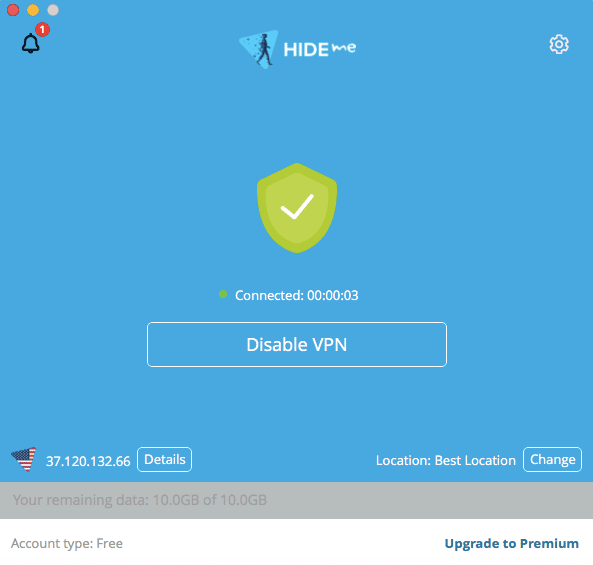
best option that lets you choose your own server location.
Stats:
- Free plan: Unlimited data, eight locations
- Money-back guarantee: 30 days
- Website: hide.me
- Fast speeds
- No data consumption limits
- Can choose your own location
- No free servers in Asia
- Can’t unblock all streaming apps
- Can’t choose location after 10GB a month
hide.me isn’t at the top of my list because of its rate of success in China. Though it is capable of getting around the Great Firewall, its success rate isn’t comparable to those of VyprVPN or Astrill. Instead, I’ve named it the best free VPN for China because of the incredible convenience of its free plan.
hide.me is one of two free VPNs on this list with no usage limits — you can do as much streaming, browsing and chatting as you want without paying a single yuan. It edges out the other limitless free VPN, Proton VPN, by letting you freely choose your server location for the first 10GB you use every month. After that limit, it’ll choose for you at random.
My Experience With hide.me: Hands-On Performance
Not getting to pick your server location after using 10GB in a month isn’t as annoying as you’d think, but sadly, there is a different problem: hide.me’s eight free server locations are all in Europe or the United States. However, it’s not as bad as it sounds, because hide.me’s download speeds are fantastic at any distance.
Actually using hide.me is a smooth experience. The interface is nice to look at on both desktop and mobile, and the settings page is designed around ease of use. Settings like split tunneling and the strong kill switch (called Stealth Guard) are carefully explained. The auto-connect feature offers options much deeper than the usual “connect on startup.”
If you’re interested in taking it to China — and you should be — my hide.me review has the full story.
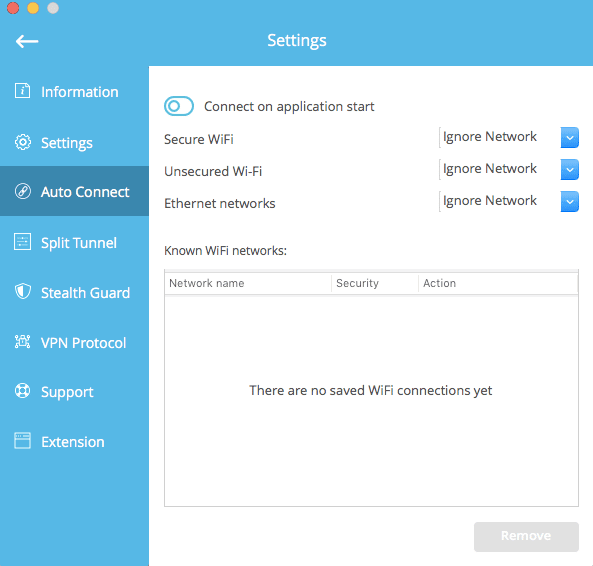
hide.me Test Results
hide.me isn’t the fastest VPN I tested for this list — Proton VPN’s speeds were quite a bit better. However, the difference wasn’t stark enough to overcome hide.me’s other advantages. Notably, I retained 80% of my download speeds in Australia, proving that hide.me can deliver fast connections over the long distances between its free servers and China.
| Location: | Download (Mbps) | Upload (Mbps) |
|---|---|---|
| 📂 Portland, Ore., USA* | 59.02 | 5.86 |
| 🇺🇸 United States | 56.55 | 5.61 |
| 🇬🇧 United Kingdom | 50.13 | 5.06 |
| 🇧🇷 Brazil | 55.59 | 5.42 |
| 🇿🇦 South Africa | 40.52 | 3.51 |
| 🇸🇬 Singapore | 33.45 | 3.86 |
| 🇦🇺 Australia | 47.22 | 2.82 |
| Average: | 47.24 (80%) | 4.38 (75%) |
hide.me Pricing and Value
Should you decide that you need access to Asian servers for the best performance, you can get hide.me’s premium plan for relatively little money. It’s currently going for $9.95 per month, but you can get six months for $5.82 per month (billed once as $34.95) or 15 months for $3 per month (billed once as $54.95). Every plan can be refunded for up to 30 days.
- $3 per month
2. Proton VPN — Fastest Free VPN for China
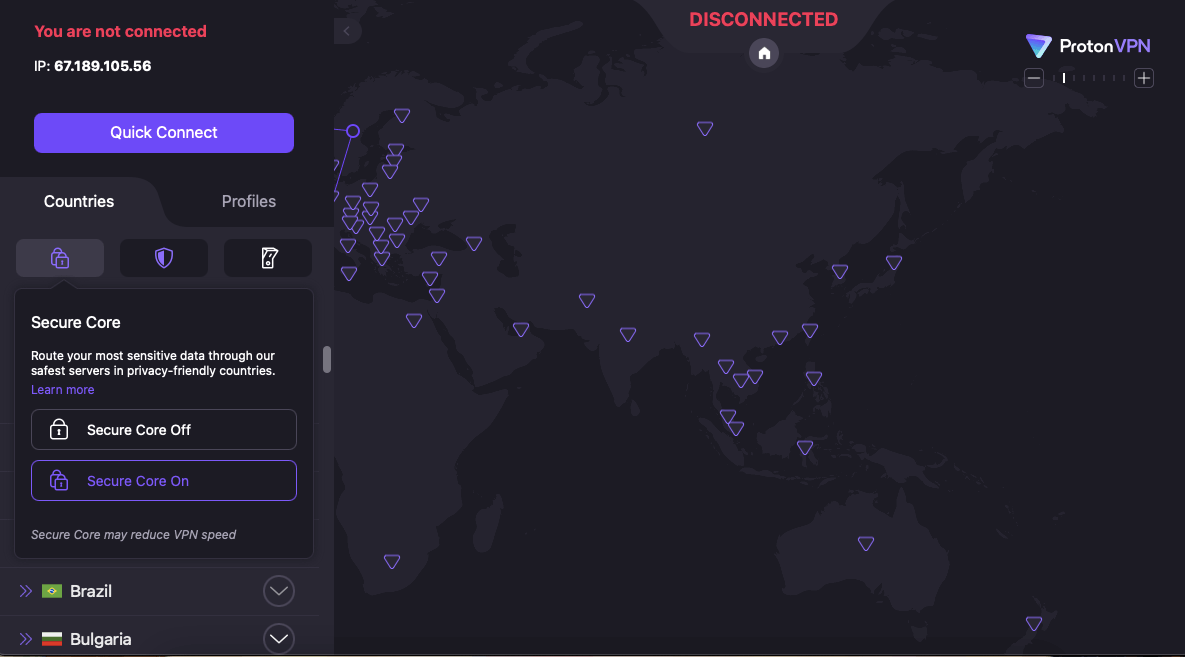
Stats:
- Free plan: Unlimited data, five server locations
- Money-back guarantee: 30 days
- Website: protonvpn.com
- Free servers in Japan
- No data limits on free plan
- Fastest speeds in my tests
- Overpriced two-year plan
- Can’t choose servers on free plan
- No split tunneling on macOS or iOS
Proton VPN is my favorite free VPN and one of my top VPNs overall. I’ve raved about it not only in my full Proton VPN review, but also in enough meetings that my colleagues are starting to get annoyed. As a fully open-source service and, as far as I know, the only VPN fully supported by a nonprofit, Proton VPN is among the top choices if you care about privacy.
It works with some reliability in China, despite periods of inactivity when the Great Firewall has directly targeted it. However, the real draw is the free plan, which never limits your data usage and gives you the same exceptional speeds regardless of whether you pay. The only drawback is that you cannot choose your server.
My Experience With Proton VPN: Hands-On Performance
As with hide.me, I thought not being able to select a free server would be annoying, but Proton VPN only has five free locations. Additionally, it’s not a random choice; your VPN client picks whichever server is currently fastest, which will probably be in Japan if you’re in China. You can change servers if your first pick doesn’t work, but the choice will be random in that case.
Another commonality with hide.me is that Proton VPN takes the sting out of its limitations by being a joy to use. It’s the fastest free VPN I tested for this article, and in my tests it actually beat out ExpressVPN, the one paid option that made this list. Its dark-mode apps are nice to look at, laid out intuitively and unencumbered with ads.
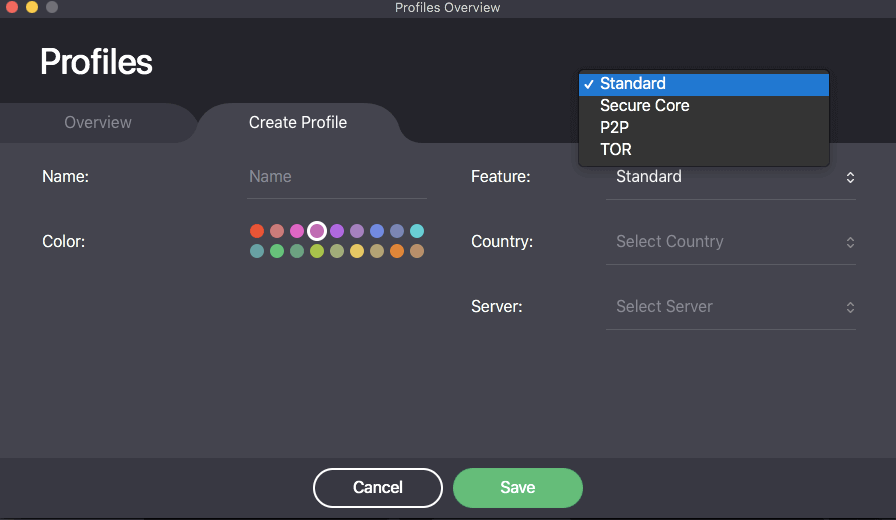
including Profiles, are only available for a fee.
Proton VPN Test Results
The first time I reviewed Proton VPN, I encountered a feature I thought was a marketing gimmick: a “VPN accelerator” that can “boost VPN speeds by up to 400%.” After a few rounds of speed testing, I’m no longer so quick to write it off.
According to Proton VPN, the VPN accelerator, which is included on free plans, balances the processing load on each server to eliminate congestion. Though this sounds like fairly standard technology, I can’t deny it works — Proton VPN is fast enough to make any server usable from China. My average worldwide speed drop was less than 10%.
| Location: | Download (Mbps) | Upload (Mbps) |
|---|---|---|
| 📂 Portland, Ore., USA* | 59.00 | 6.00 |
| 🇺🇸 United States | 55.74 | 5.64 |
| 🇬🇧 United Kingdom | 54.87 | 5.88 |
| 🇧🇷 Brazil | 56.53 | 5.64 |
| 🇿🇦 South Africa | 51.42 | 4.95 |
| 🇸🇬 Singapore | 52.36 | 5.31 |
| 🇦🇺 Australia | 52.98 | 5.64 |
| Average: | 53.98 (91%) | 5.51 (92%) |
Proton VPN Pricing and Value
Paying for Proton VPN gets you all its special features, including the ability to use your own DNS server, which can be a huge help in China. The one-month plan for $9.99 and the one-year plan for $4.99 per month ($59.88 total) are both great deals. However, I can’t say the same of the two-year plan, which is too expensive at $4.49 per month ($107.76 total).
- $4.99 per month
3. Windscribe — Free China VPN With Unlimited Simultaneous Connections
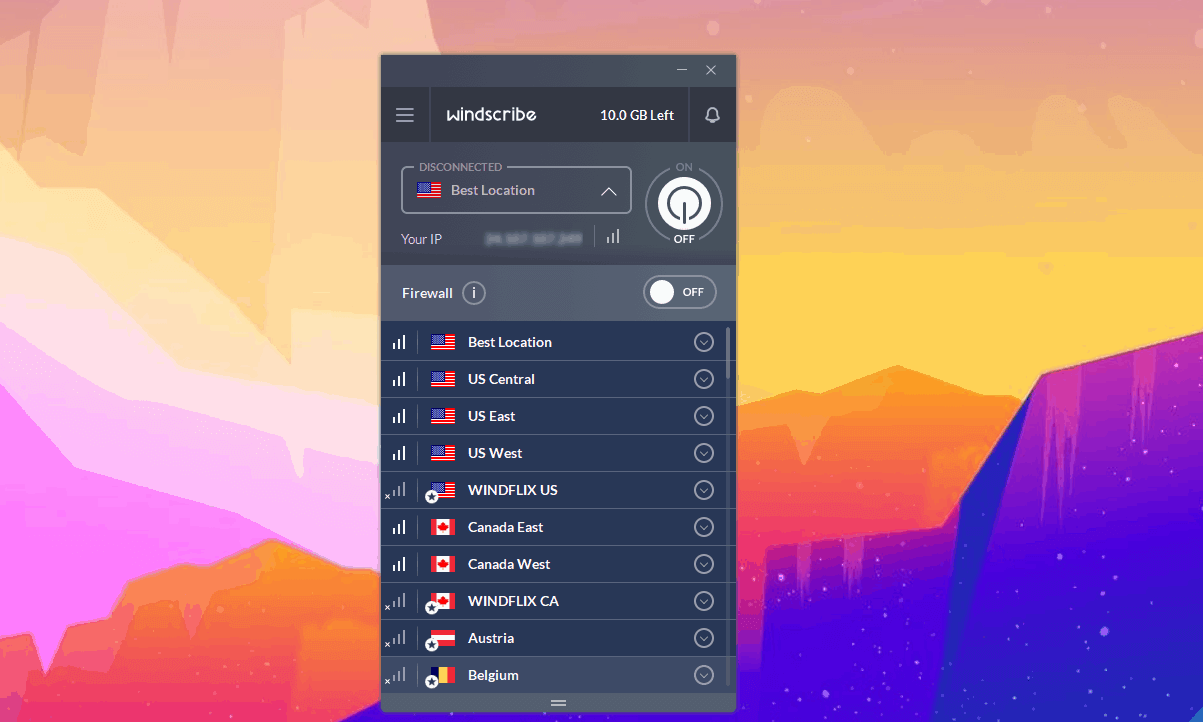
Stats:
- Free plan: 2GB per month; 10GB per month if you sign up for the mailing list; 15GB per month if you post about Windscribe on X/Twitter
- Money-back guarantee: Seven days; must have used less than 10GB
- Website: windscribe.com
- No lapses in China
- Unlimited free connections
- Free Hong Kong server location
- Bad desktop interface
- Limits data usage per month
- Must subscribe to emails for more data
Windscribe is a reliable free VPN that distinguishes itself as one of the few services still dedicated to the free plan as a plan in itself rather than as an add-on. It’s better than average at flying under the radar in China and has not, to my knowledge, suffered a recent down period like some of its direct competitors. My Windscribe review has more info.
It does cap the data you can use per month for free, but the limits are pretty generous. The cap starts at 2GB but increases to 10GB if you sign up for marketing emails, which are annoying but can be deleted. You can increase the limit to 15GB if you post about Windscribe on X. There’s also no limit on connections per free account.
My Experience With Windscribe: Hands-On Performance
I do have to mention one detail whenever I recommend Windscribe: Its visual design on desktop is garbage. There’s no sugarcoating it — it looks like a VPN that was crushed in a hydraulic press. Fortunately, the same choices work a lot better on mobile. If you’ll mainly be using a phone or tablet to go online while in China, you’ll have no issues with Windscribe.
The interface may be hard to use, but it still has some perks for free users. Any plan lets you use a content blocker called R.O.B.E.R.T. to intercept domains connected to malware and adware. You can also get a free double-hop connection by downloading both a desktop app and a browser extension and setting them to different server locations.
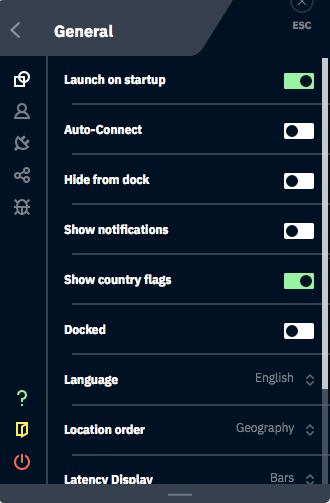
Windscribe Test Results
Windscribe’s speeds are solidly in the middle of the pack. Distance didn’t have much of an impact on download or upload speeds, so its free server locations should give you a good experience in China. Notably, each location has several servers to choose from — if one proves sluggish, another might work better.
| Location: | Download (Mbps) | Upload (Mbps) |
|---|---|---|
| 📂 Portland, Ore., USA* | 59.02 | 5.86 |
| 🇺🇸 United States | 53.11 | 5.63 |
| 🇬🇧 United Kingdom | 48.26 | 5.39 |
| 🇧🇷 Brazil | 39.17 | 3.51 |
| 🇿🇦 South Africa | 42.41 | 5.13 |
| 🇸🇬 Singapore | 46.01 | 5.16 |
| 🇦🇺 Australia | 47.37 | 4.74 |
| Average: | 46.10 (78%) | 4.93 (84%) |
Windscribe Pricing and Value
Windscribe’s best value comes from its build-a-plan option, where each server costs $1 per month. If you want the full package, it’ll cost you $9 per month or $5.75 per month for a year ($69 total). In my opinion, the former is worth it but the latter is not — I’m pretty sure it’s just for the meme.
Each plan comes with a seven-day money-back guarantee that’s only honored if you’ve used less than 10GB of data. Don’t get confused and assume it’s 30 days like all the others, or you might lose money.
- $5.75 per month
4. TunnelBear — User-Friendly Free VPN
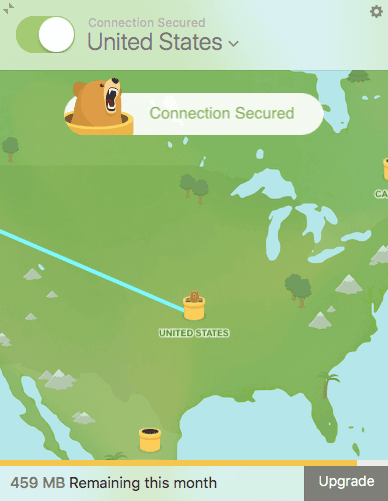
Stats:
- Free plan: 2GB per month
- Money-back guarantee: None
- Website: tunnelbear.com
- Affordable paid plans
- Friendly for new users
- Free plan has all server locations
- No refund policy
- Only 2GB per month for free
- Can’t always unblock streaming sites
TunnelBear is clearly positioned as a VPN for people who aren’t comfortable with technology. From its bear mascots — a bit to which it commits more than you might expect — to its streamlined apps and menus, this is the choice for the China traveler who’s never used a VPN before. I wrote a full TunnelBear review, where you can learn more about it.
However, the most important detail to know is that TunnelBear does work in China (despite Chairman Xi’s well-known antipathy toward bears). Free users also get access to all 47 server locations, including China-friendly options in Japan, Singapore and South Korea. However, you can’t use more than 2GB of data in a month without paying.
My Experience With TunnelBear: Hands-On Performance
Since TunnelBear’s free data limit is so low, it’s best as a backup VPN. It has a good chance of working in China where other providers don’t. You can improve that chance even more by using the GhostBear obfuscation protocol, which makes your VPN traffic less identifiable. The VigilantBear kill switch has never misfired for me yet.
Although you can select any server while using TunnelBear’s free plan, you can’t choose between cities within a country. In fact, there’s very little you need to choose at all. TunnelBear works quietly and doesn’t ask much of users, which makes it a great companion when you’re stressed about needing to get online.
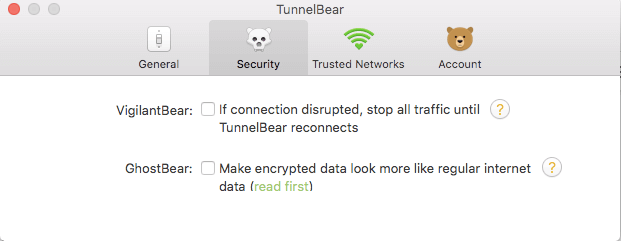
TunnelBear Test Results
TunnelBear yielded a middle-of-the-pack speed performance, comparable to Windscribe. This is the only VPN on the list where all my regular test locations are accessible on the free plan, so the table below paints a clear picture of the kind of performance you can expect.
| Location: | Download (Mbps) | Upload (Mbps) |
|---|---|---|
| 📂 Portland, Ore., USA* | 59.02 | 5.86 |
| 🇺🇸 United States | 55.86 | 5.60 |
| 🇬🇧 United Kingdom | 48.75 | 4.37 |
| 🇧🇷 Brazil | 50.19 | 5.20 |
| 🇿🇦 South Africa | 41.29 | 4.00 |
| 🇸🇬 Singapore | 49.02 | 4.33 |
| 🇦🇺 Australia | 54.71 | 4.77 |
| Average: | 49.97 (85%) | 4.71 (80%) |
TunnelBear Pricing and Value
If you plan to pay for TunnelBear, don’t forget that it has no refund policy. You can’t use its money-back guarantee as a free trial like you can on some other services. A TunnelBear subscription costs $9.99 for a month or $3.33 per month for a year ($39.99 total). You can also sign up for three years at a time, but it will still cost $3.33 per month.
- $3.33 per month
5. ExpressVPN — Best VPN for China With Free Trial
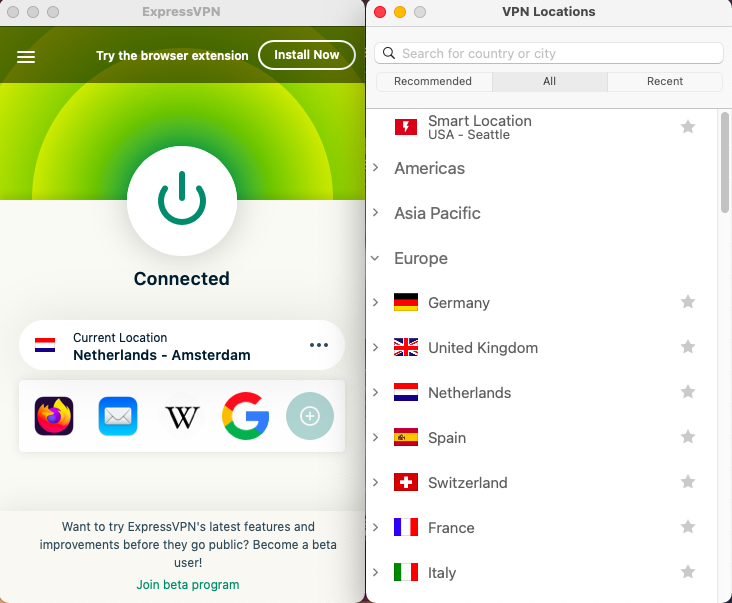
spend more than a month in China, you can game its refund policy.
Stats:
- Free plan: None
- Money-back guarantee: 30 days
- Website: expressvpn.com
- Easy to use
- Copious servers in Asia
- Fast connections & downloads
- No free plan
- Some virtual servers
- Few special features
I’ll lay all my cards on the table: ExpressVPN is not technically a free VPN. That said, after the four I listed above, there aren’t any free VPNs I trust more than I trust ExpressVPN in China. Since it always honors its 30-day money-back guarantee, you can use it to cover any trip to China that lasts less than a full month.
That’s great news, because ExpressVPN is the best VPN out there and the best VPN for China. Its apps never stutter, its speeds barely drop at any distance and I’ve never once seen it fail to access a streaming site. It had some issues in China in 2023, but it has since overcome them and bounced back even better. My full ExpressVPN review has the scoop on why you should take these claims seriously.
My Experience With ExpressVPN: Hands-On Performance
Going by the sheer ease of setting and forgetting it, ExpressVPN is the easiest VPN to use. It’s perfected the UI design all other VPNs are copying, with the most important features up front and everything else located within two clicks — and clearly explained in-app. The critical features for China can be toggled on and off in seconds.
One of those features is obfuscation, which is automatically activated anytime you use the OpenVPN protocol. It isn’t as speedy as Lightway but is still plenty fast. It also has server locations all around China, giving you no shortage of options if one access point doesn’t work. Some of these servers may be virtual, but they all perform well nonetheless.
If you’d like to learn more about OpenVPN and other protocols that virtual private networks use, check out my guide that covers six VPN protocols.
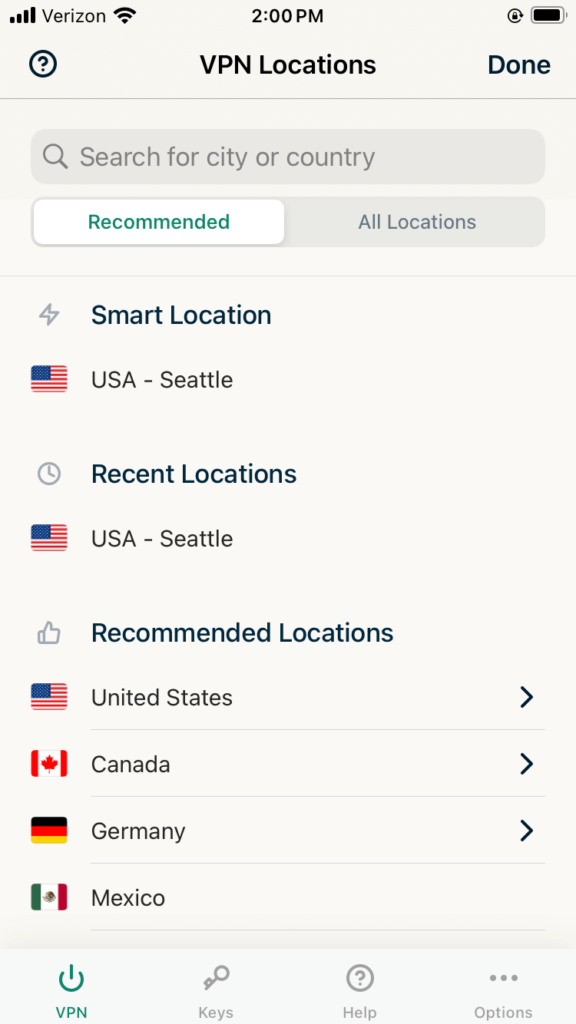
ExpressVPN Test Results
ExpressVPN isn’t quite as fast as Proton VPN or some of its other competitors — for example, I discuss how NordVPN is technically faster in my NordVPN review. However, its average speeds are excellent in most locations. I lost only 13% of my download speed on the Singapore server from the western U.S., which indicates this location should work well in China.
| Location: | Download (Mbps) | Upload (Mbps) |
|---|---|---|
| 📂 Portland, Ore., USA* | 58.73 | 5.72 |
| 🇺🇸 United States | 55.15 | 5.56 |
| 🇬🇧 United Kingdom | 50.73 | 5.58 |
| 🇧🇷 Brazil | 50.37 | 5.06 |
| 🇿🇦 South Africa | 43.74 | 4.25 |
| 🇸🇬 Singapore | 51.12 | 5.23 |
| 🇦🇺 Australia | 51.59 | 4.95 |
| Average: | 50.45 (86%) | 5.11 (89%) |
ExpressVPN Pricing and Value
ExpressVPN is more expensive than most of its competitors, but that won’t matter if you’re using the 30-day money-back guarantee. If you do decide to pay, one month costs $12.95, the six-month plan costs $9.99 per month ($59.95 total) and the 12-month plan costs $6.67 per month ($99.95 total, including three bonus months).
- $6.67 per month
Community Discussion: Other Free VPNs for China Mainland
Of course, the providers I’ve mentioned so far aren’t the only options that will work in mainland China. Since I recommend that anyone traveling to China bring at least three VPNs, it helps to consider a range.
For example, ExpressVPN isn’t the only premium VPN with a long-enough refund period to cover a substantial amount of time in China. Both NordVPN and Surfshark have similar money-back guarantees and are known to work well in China. I’ve written a Surfshark review where you can learn more.
PrivateVPN has a strong record of working in China, though I don’t think much of it overall. It also has a 30-day money-back guarantee. Finally, you might consider Hotspot Shield, a fully free VPN with no data limits. However, I have some concerns about its privacy that keep me from wholeheartedly recommending it, as my Hotspot Shield review explains.
What’s the Best Free VPN for China for Android & iPhone?
All the VPN services I named in my list above have Android and iOS apps, so my answer is the same: hide.me and Proton VPN are your best choices. Both of those VPNs have well-designed mobile apps that function much like their desktop apps, with the same speeds and security features.
They also both make Android APK files available through a separate link, which you can use to download them from within China without getting blocked. If none of your chosen VPNs are working in China but you have an Android phone, this can be a lifesaver.
Free VPNs to Avoid in China
Avoid any free VPN I haven’t directly named as safe — that’s any service other than hide.me, Proton VPN, Windscribe, TunnelBear or PrivateVPN. Hotspot Shield is a good fallback, though its free version is packed with obnoxious ads.
Far too many other free VPNs either do nothing for your privacy or actively exploit you. For example, Hola VPN lets its corporate clients use your device as a proxy, and Psiphon VPN does nothing to actually mask your IP address. If you’re unsure about a free VPN, read the reviews and trust your gut.
How to Install & Use a VPN in China
The answer to “How do I install a VPN in China?” is “Don’t” — you should have your VPNs downloaded and set up before you arrive. Most VPN websites are blocked in China. Though you can sometimes access the files through mirror links, it’s easier to do a little homework ahead of time. Here’s how to download, install and use a free VPN before visiting China.
- Choose at Least Three VPNs
- This makes it much more likely that one of them will work on any given day in China.
- Find the Downloads Page on Each VPN’s Website
- You can usually find a download tab at the top of the homepage. It’s different from the “get VPN” links you’ll also see, as those assume you’ll be paying. Unless you’re using a free trial of a paid VPN, a free VPN won’t ask you for a payment method — if you are asked for your credit card number, you’re in the wrong place.
- Download the VPN on Every Device Where You’ll Need It
- Extract the downloaded file and launch the VPN app. If prompted, create an account online, then use its credentials to sign in to the VPN client. Many free VPNs only allow you to use them on one device, so you may need to make multiple accounts.
- Test Each VPN
- Frustratingly, you can’t know whether a VPN will work in China without actually being in China, but you can learn your way around the user interface. At a minimum, learn how to connect to a server, change server locations and activate the kill switch.
Getting a VPN From Within China: Tips
Assume you won’t be able to directly download any reputable VPN while in China. Not only are most VPN websites blocked, but the Google Play store is also completely unusable and apps the government objects to disappear from the Apple app store. However, if you do find yourself in need, there are a few tricks you can try.
- Email customer support. Save the support email addresses for your VPNs of choice. They can link you to a mirror site or send you a direct download link in a pinch. Gmail is blocked in China, but some email clients still work, including Outlook.
- On iOS, change your app store location. The Apple app store is accessible from China — it’s just missing all the good VPNs. If you shut off location services and then go to your Apple profile and change your location from China, you may be able to download censored apps.
- On Android, download the APK from a third party. Android users may be able to get a direct link to download an APK (application programming kit) that installs a VPN app. Make sure to vet any download site that isn’t official.
- Use Tor Browser. The Tor Network can get you online in China, especially if you use the Snowflake setting (available in the “configure connection” menu). If you’re already in the country, send a Telegram message to @gettor_bot or email [email protected].
- Visit a tourist hotel. Some hotels in China sneak VPNs onto their WiFi systems so tourists can access familiar websites. The latest crackdown is closing these loopholes, but if you can get online at a posh hotel, you might get lucky.
Are VPNs Legal in China?
Yes, VPNs are legal in China. The Chinese government has tried to ban all VPN traffic in the past, but the blanket prohibition cost too much money. Businesses are now allowed to use VPNs approved by the government. Most are offered by large telecoms at prices prohibitive to individuals and small businesses.
It is illegal in China to use any VPN that the government hasn’t explicitly authorized. However, as far as I know, no foreign visitor to China has ever been arrested or prosecuted for using an unauthorized VPN. Chinese citizens have received prison sentences, but not travelers — Xi’s dictatorship is nothing if not brand-conscious.
How Does China Block VPNs?
The Great Firewall relies on a mixture of technologies to block VPN traffic. The first line of defense is IP filtering, which blocks you from accessing certain websites through Chinese servers, including VPN homepages. This can also block IP addresses associated with VPN server networks.
There’s also DNS poisoning, in which your request seems to resolve but sends you to a nonexistent domain or an alternative site. The Great Firewall has been known to use DNS poisoning to divert traffic away from some sites and towards others it also disapproves of, effectively launching DDoS attacks on its own citizens.
Is It Safe to Use Free VPNs in China?
Yes, it is safe, as long as the free VPN service is honorable (which many aren’t — see “Free VPNs to Avoid in China,” above). A good free VPN offers the same protection as a premium service, with encryption that hides you from both hackers and Chinese government surveillance.
Is It Safe to Use a Chinese VPN Provider?
I would not recommend using Chinese VPN companies. In addition to being notoriously expensive, China-based VPN providers are almost certainly required to give the government backdoor access to their systems, and log user data to boot.
How Do I Get a Chinese IP Address?
Almost no VPNs maintain physical server locations in China, since that would require them to log user data in compliance with Chinese government law. Some, including CyberGhost, have virtual servers that can give you a China IP address (read our CyberGhost review). Many more VPNs, including most on this list, have servers in Hong Kong and Macau.
Risks of Using a Free VPN: China
Unless you’re a citizen of China, you probably aren’t facing any risk of punishment under the law, but a poorly chosen free VPN can still annoy you in plenty of ways. Let’s count a few.
- The VPN won’t work: Quite a few free VPNs I’ve tried have either refused to connect or failed to mask my IP address — and I wasn’t even in China when I tested them. Under the Great Firewall, a bad free VPN has a high chance of not working at all.
- You’ll run out of data: Even the best free VPNs tend to place limits on your data usage. If you try to do too much within a month, you may find yourself cut off.
- You won’t get customer support: Free VPNs often skimp on customer service. This can be fatal if you need help re-downloading the VPN from within China.
Troubleshooting Tips: VPN Not Working in China
If your free VPN — or any VPN — doesn’t connect in China, try these troubleshooting steps in this order.
- Try a different server location. You may have been attempting to connect to a server the Great Firewall knows and blocks.
- Try a different VPN protocol. You might have been connecting on a port commonly used by VPN traffic.
- Set up a manual connection. If your VPN offers configuration files, you can download one and set up your own connection. You’ll need a protocol app like WireGuard or TunnelBlick; either download it before you go, or ask your VPN’s customer support to send you a link.
- Switch to another VPN. One of your backup VPNs may succeed where the first failed. Wait a day or so before trying your first service again.
Conclusion
Although I can’t guarantee that any given VPN will always work in China (and anybody who claims that one can is lying), I can say that hide.me, Proton VPN, Windscribe and TunnelBear are the four best free VPNs to use there. However, if you’re in China for less than 30 days, subscribe to ExpressVPN and request a refund.
Have you tried using a free VPN in China lately? Was it one of my recommendations, or a service I missed? How well did it work? Let me know in the comments, and thanks for reading.
FAQ: Getting a China VPN Free
Which VPN Works in China?
Astrill, Mullvad and VyprVPN are the best-performing VPNs in China right now, but none of them are free. Among free services, hide.me and Proton VPN have the best records.Does hide.me Work in China?
Yes, hide.me currently works in China. However, that can change by the day, so bring a few backups on your trip.Are VPNs Illegal in China?
VPNs are not illegal in China, but you’re only allowed to use services approved by the government. Naturally, this doesn’t include any providers popular outside China.Is ExpressVPN No Longer Working in China?
As of July 2024, ExpressVPN appears to be working in China. This can change quickly, so check reports before you go.

Leave a Reply